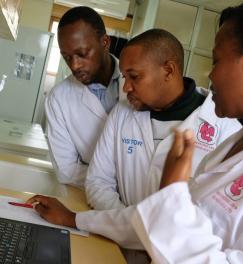2020 Annual Report
A year marked by COVID
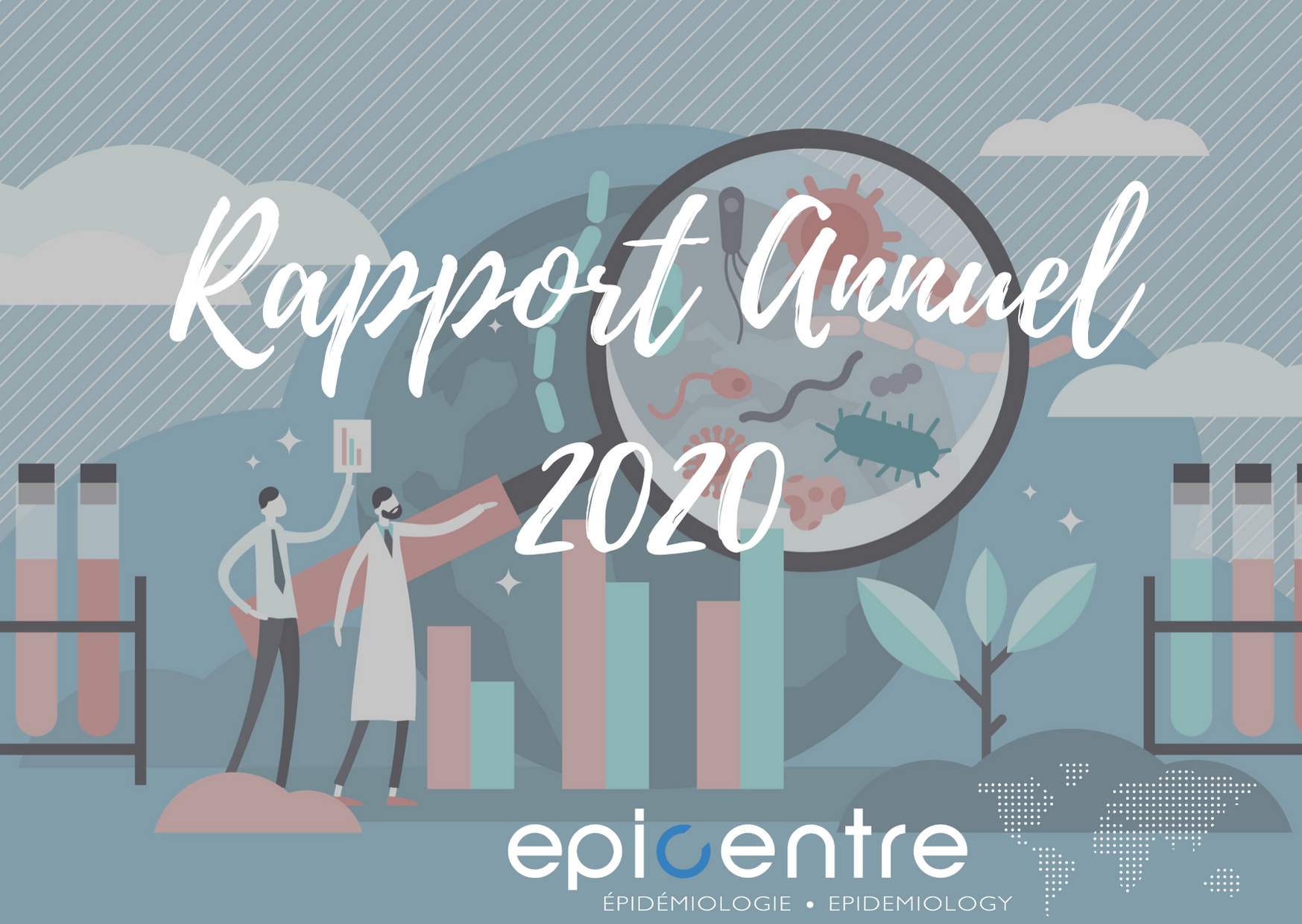
An MSF satellite dedicated to epidemiology and research, Epicentre's mission is to describe and analyze the health situations of the populations rescued by medical teams in order to better guide the programs, but also to compare new care practices in order to propose solutions adapted to populations living in unstable conditions or with inadequate access to care.
For several months, the Covid pandemic has required responsiveness and adaptation to ensure that Epicentre is consistent with MSF's needs, participates in the global scientific effort, and implements new working conditions. Epicentre's response to the pandemic has been largely geographically dependent and evolving throughout 2020 and 2021. New tools - reports, dashboards, etc. - have been developed to describe the epidemic and clinical types in MSF's intervention sites. Today, these tools cover nearly 50 countries. These tools provide a vision of the profile of patients under care and the severity of their disease and thus allow for better anticipation of needs at MSF intervention sites. Epicentre, with the Niger Ministry of Public Health and the MSF Foundation, has also deployed the Alert-COVID-19 platform to identify cases of Covid, and with time recurrent diseases in this country such as measles and meningitis. The knowledge and know-how developed during the pandemic have been designed to better deal with other epidemics and even the emergence of new infectious diseases. Given the many unknowns about the impact of the pandemic on the African continent, Epicentre continues to conduct seroprevalence surveys in several countries and among health workers.
The health crisis has obviously impacted the continuation of some projects, and even their launch. However, every effort has been made to ensure that Epicentre's projects on other diseases that affect MSF's regions of operation continue.
Key figures 2020 & areas of intervention
- Teams of epidemiologists in the field: Cameroon, Mali, DRC, Malawi, Chad, South Sudan, Niger, Uganda
- Relocated teams in New York, Dubai, Dakar, Geneva, Brussels, London, Cape Town
- 1 research department
- 1 Epidemiology, Intervention and Training Department
- 67 publications in international peer-reviewed journals
- 264 projects, 119 of which were initiated during the year 2020.
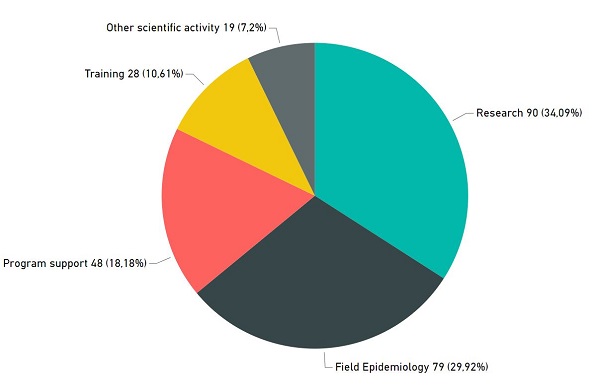
Intervention in about 50 countries, mainly in Africa (187 projects on the African continent).
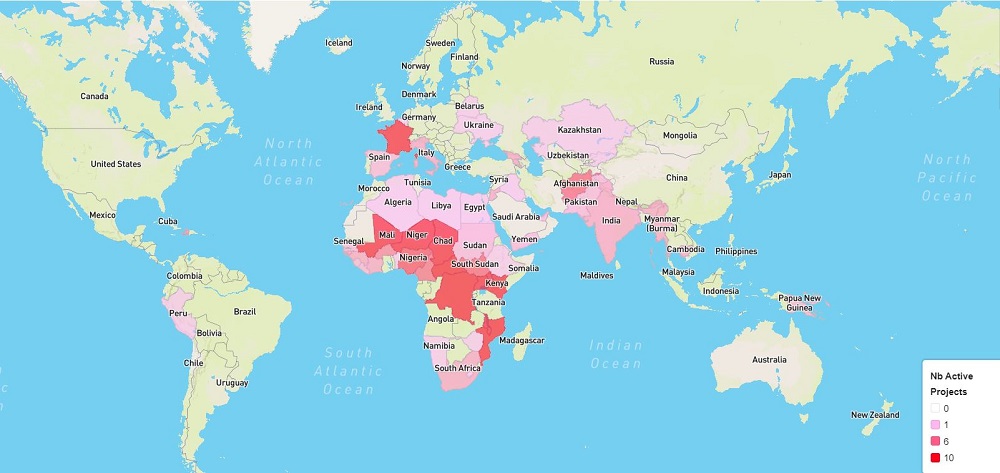
2020 Highlights: Responding to the COVID pandemic, but not only!
Describe the Covid-19 epidemic
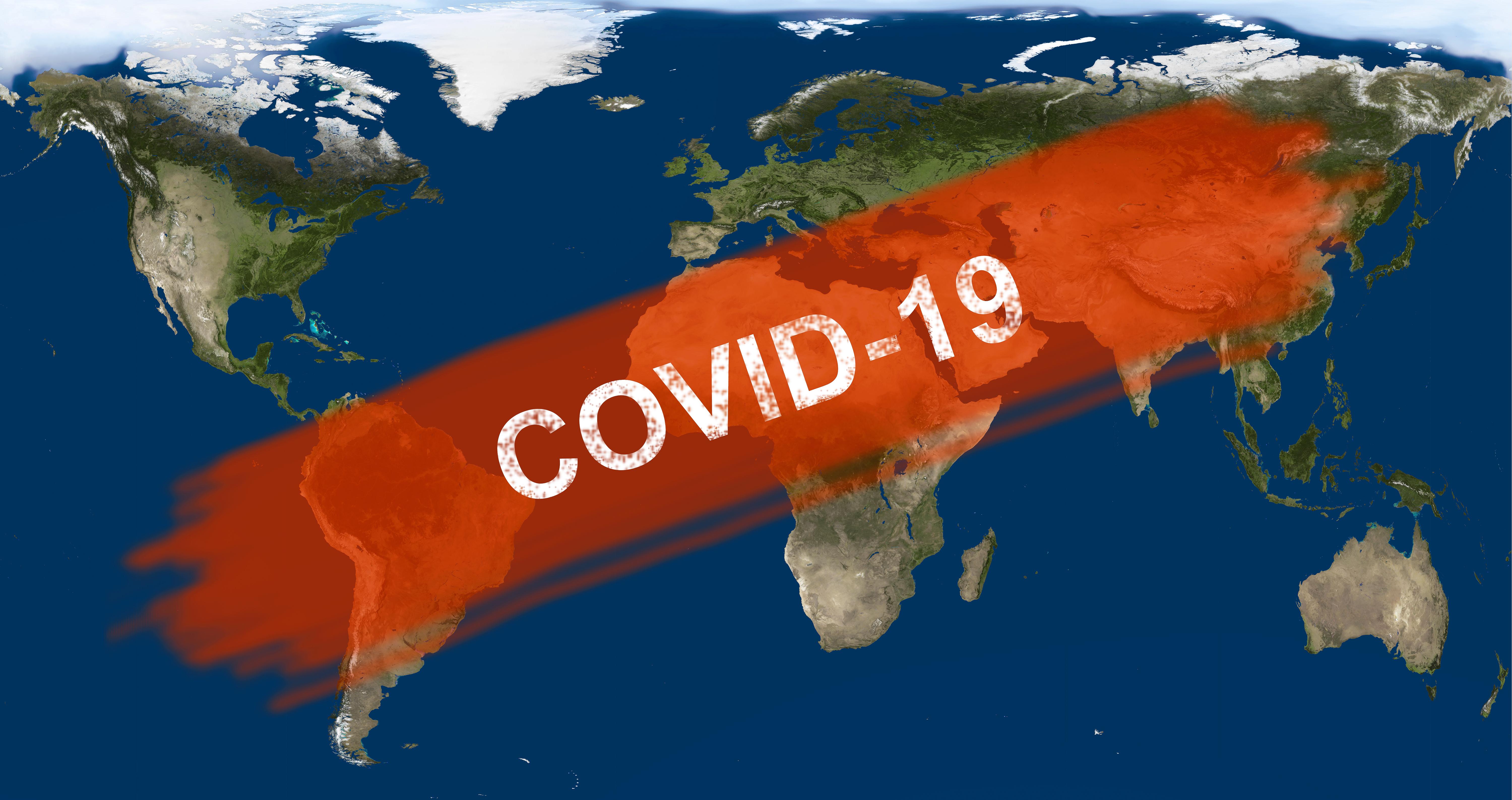
In 2020, 44 projects focused on Covid-19, demonstrating the involvement and response of Epicentre teams to the pandemic. They cover all areas of expertise: 14 projects in support of MSF programs, 18 in field epidemiology, 10 in research and 2 in training.
Understanding epidemics at the local level is crucial to provide useful information for operations. In its operational support mission, Epicentre provides the appropriate tools to all MSF sections to collect data and compile information from all projects into a single database, then analyze this data on a weekly basis and produce a monthly report for some 50 countries. This epidemiological surveillance allows MSF to monitor the evolution of the epidemic in its intervention sites, the clinical situations of patients in order to improve their care, to better localize epidemic waves and thus anticipate their short-term evolution.
Better understanding the scope of the pandemic
Given the continuing unknown impact of Covid-19, particularly in Africa, Epicentre has initiated several seroprevalence studies, sometimes accompanied by retrospective mortality surveys, in Mali, Yemen, Niger, Côte d'Ivoire, Cameroon, DRC, Dagahaley refugee camp, and Garissa County, Kenya, to assess the intensity of the virus circulation. Data collection is ongoing in several sites.
In France, Epicentre with MSF Paris and Institut Pasteur has shown in fourteen sites with persons in precarious situations that between 18% and 94% of people have been infected with the SARS-CoV-2 virus. MSF was thus able to establish recommendations consisting in favoring hotel placements and accommodations with individual living spaces rather than collective places such as gymnasiums, to shelter people without accommodation during the pandemic.
Adapt and support intervention strategies
While by definition a pandemic is global, its impact, related needs, and heterogeneous progression vary from one geographic area to another, requiring the implementation of responses appropriate to the environment.
In Niger, Epicentre, the MSF Foundation, Medic Mobile, the Ministry of Public Health and Google have collaborated to deploy an electronic tool that organizes the reception and investigation of Covid-19 alerts. It relies on adequate training of the various actors and the collection of alert data in a structured manner to ensure efficiency and completeness. The Niger center is also a site of the COPCOV study, a randomized international study coordinated by the Mahidol Oxford Tropical Medicine Research Unit (MORU), aimed at exploring different avenues of prophylaxis among health care workers.
In Cameroon, to overcome logistical difficulties associated with PCR testing, MSF, the Ministry of Public Health, and Epicentre evaluated the performance of five rapid diagnostic tests - four based on antibody testing and one based on antigen detection - to detect SARS-CoV-2 infection in community settings. Based on initial results demonstrating the reliability of these tests, Cameroon validated a national screening algorithm for Covid-19 and began using the rapid diagnostic tests on July 12, 2020.
Epicentre is also a partner of the Anticov clinical study taking place in 13 African countries under the coordination of the Drugs for Neglected Diseases initiative (DNDi). The objective of this study is to identify treatments that can be used to treat mild and moderate cases of Covid-19 early on and to prevent spikes in hospitalization that could overwhelm fragile and already overburdened health systems in Africa.
Because of the pandemic, some projects have seen their focus change slightly. This is the case for the study conducted with MSF Brussels to evaluate the FujiLam urine diagnostic test for tuberculosis in HIV-positive patients in Uganda, Kenya, Mozambique, and South Africa, to which a secondary component has been added: it consists of evaluating the prevalence of Covid-19 in HIV-positive ambulatory patients with symptoms of tuberculosis, describing their clinical characteristics and the severity of their disease.
Other projects focused on determining the impact of new care protocols, such as telemedicine, whose implementation has accelerated due to the health crisis. Among them, a survey was conducted to evaluate the experience of remote consultations - video or telephone - for patients with mental disorders in different MSF intervention sites. While this alternative appears acceptable in humanitarian contexts during the pandemic, it is not suitable for victims of sexual or interpersonal violence, patients with severe mental health problems, or in pediatrics or geriatrics.
In Lombardy, Italy, Epicentre has demonstrated the effectiveness of telemedicine in monitoring Covid-positive patients and reducing hospitalizations. In the Marche region of Italy, during the first wave of Covid-19, MSF trained a group of physicians in pulmonary ultrasound (POCUS) and its interpretation at home. Epicentre conducted a study to describe the implementation of this novel protocol and feedback on the clinical management of suspected or confirmed Covid cases.
Without forgetting the other diseases
While some projects have had to be stopped, most have continued. They range from prevention to treatment, always with the objective of providing information and feasible solutions to improve access to quality health care for populations living in precarious conditions or with insufficient access to care.
Malnutrition has been the focus of several studies. 2020 was marked by the resumption, in collaboration with MSF Paris, of surveillance in Chad to estimate the prevalence of malnutrition, but also by the start of omics analyses (genomics, transcriptomics, proteomics, etc.) in the framework of a project with MSF Brussels to understand the etiology and pathophysiology of kwashiorkor. The project with MSF Amsterdam evaluating the use of MUAC as an anthropometric criterion for admission, follow-up and discharge of patients with severe forms of kwashiorkor has entered its final phase.
For cholera, another topic on which Epicentre has been working for a long time, a new project was launched with MSF Geneva, MSF Brussels, MSF Paris and MSF Amsterdam: CATI (Case-Area Targeted Intervention). It will explore in Cameroon, DRC and Zimbabwe the benefits of early detection of clusters to trigger a rapid, localized and combined response and thus reduce transmission in the households and in the surrounding environment.
Following numerous measles epidemics in the DRC, including the most recent one between 2018 and 2020 when more than 460,000 children contracted the disease and nearly 8,000 died, MSF Paris and Epicentre set up the URGEPI project in the south of the country, in the former Katanga, to better respond to recurrent waves of measles. Global epidemic surveillance is carried out through an alert system, the threshold of which has been established based on previous experience and vaccination coverage.
Vaccinate to prevent disease
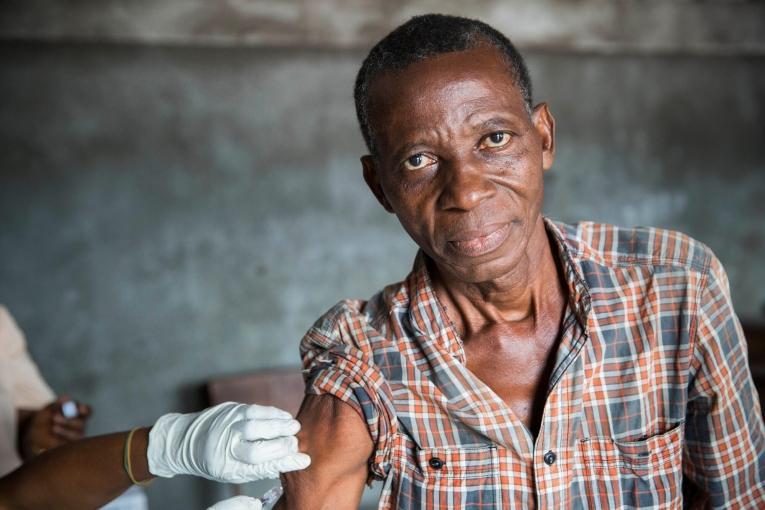
In terms of prevention, Epicentre is participating in several clinical trials of a new Ebola vaccine, the MVA-BN vaccine, to protect populations before outbreaks reach high-risk areas. For yellow fever, in collaboration with the Kenya Medical Research Institute, Institut Pasteur in Dakar, and the WHO in Mbarara, Epicentre has shown that administering a fifth dose of the vaccine is effective and could allow millions more people to be vaccinated in an emergency situation and overcome the lack of stockpiles. The new typhoid conjugate vaccine, newly prequalified by WHO, will be the focus of a major vaccination campaign in Harare, Zimbabwe. An Epicentre study with MSF Brussels will estimate the coverage of this campaign and measure the vaccine's effectiveness in preventing typhoid fever.
Diagnose and treat
The teams have also worked to evaluate new diagnostic solutions such as the determination of the viral load of the hepatitis C virus from a dried blood sample with MSF Paris in Cambodia, or the FujiLAM test for tuberculosis in HIV-positive people in South Africa, Uganda, Mozambique and Kenya with MSF Brussels and the ANRS. For these two diseases, which can remain latent for a long time, diagnosis opens the way to early detection of the disease and therefore more effective treatment.
As for treatment, the research center in Uganda is one of the sites of the DNDi-coordinated trial to establish the clinical pharmacokinetics, safety, tolerability, and acceptability of the new "4-in-1" formulation that includes abacavir, lamivudine, and lopinavir/ritonavir in HIV-positive children under the age of 3. Also for HIV, but in HIV-positive adults, the efficacy of the switch to the new generation of dolutegravir – tenofovir-lamivudine-dolutegravir – based triple therapy, coordinated nationally by the Malawi Ministry of Health following WHO recommendations, is being evaluated in the Chiradzulu District sentinel site.
In the area of neglected diseases, Epicentre manages the data and statistical analyses of the clinical study coordinated by DNDi in Uganda and Malawi to evaluate the efficacy and safety of fexinidazole, a once-daily oral drug for 10 days, in patients with Rhodesian sleeping sickness (caused by Trypanosoma rhodesiense).
These projects illustrate the diversity of Epicentre's interventions. To them should be added all the field epidemiology projects, which are carried out as close as possible to operational actors to guide activities, but also to ask questions and formulate hypotheses that can then lead to investigations and studies. The deployment of epidemiologists to MSF emergency and operational units continues. This is the core of Epicentre's activity, providing the knowledge necessary to guide operations and anticipate potential research and technological innovation needs to advance MSF programs.
Opening and sharing
Training in epidemiology
One of Epicentre's missions is to generate knowledge, share it and facilitate its application for the benefit of populations. Responding to emergencies, monitoring and evaluation activities, and emerging medical and humanitarian issues also requires training. Epicentre plays a major role in training MSF staff in epidemiology and public health tools, notably through two flagship trainings - Populations in Precarious Situations (PSP) and Responses to Epidemics (RepEpis) - which are recurrent and widely acclaimed, as this trainee testifies: "It is an excellent way [to] move from theoretical concepts to practical application of epidemiology. In 2020, they involved 116 people, including 104 MSF members and 12 WHO members. Based on interaction, these trainings adapt to real needs and new situations. 1 PSP session took place in Spain; for RepEpis or equivalent, they took place in Sri Lanka for MSF Amserdam, in Chad for MSF Paris, in Haiti for PAHO and the Ministry of Public Health and for the first time, a session with 20 trainees in 19 fields and speakers in 5 countries was delivered entirely online. Modules dedicated to Covid-19 were also set up and 85 people from WFP were even trained in a workshop entirely dedicated to Covid-19 in March with 5 Epicentre speakers.
 Digital learning (or e-learning) offers new possibilities and access to a wider audience. As one of the trainees in an online session noted, "What I liked most about this training (compared to a face-to-face session) was the equity: someone from Europe, the Far East, Central America and Africa can participate without any problem. Moreover, the "Epidemiology Prerequisite" module used for various training courses such as PSP, RepEpi, FOOT, Forgho, etc., and the training on epidemiological surveys are now available as e-learning on TEMBO, MSF's learning and development platform accessible to all.
Digital learning (or e-learning) offers new possibilities and access to a wider audience. As one of the trainees in an online session noted, "What I liked most about this training (compared to a face-to-face session) was the equity: someone from Europe, the Far East, Central America and Africa can participate without any problem. Moreover, the "Epidemiology Prerequisite" module used for various training courses such as PSP, RepEpi, FOOT, Forgho, etc., and the training on epidemiological surveys are now available as e-learning on TEMBO, MSF's learning and development platform accessible to all.
Although not all the sessions took place, this year allowed us to lay the foundations for future training, and even to reflect on possible developments, such as the LEAP (Leadership Educational Academic Partnership) with MSF Paris, a master's program designed by humanitarians for humanitarians, delivered jointly by the University of Manchester and the Liverpool School of Tropical Medicine. In 2021, a 15-day training course on Epidemiology and Statistics will be launched with MSF Brussels as part of the Medical Academy, and in 2022 with MSF Geneva an ad hoc RepEpis for their School of Emergencies in the DRC.
Epicentre's epidemiologists are also involved in various university degrees such as the Covid Epidemiology Master's program at Johns Hopkins University, the International Health and Tropical Medicine DIU at Sorbonne University with the Pitié Salpêtrière-AP-HP Hospital, the Global Health Emergency Master's program at the University of Bristol, and the Tropical Medicine DU at the University of Rennes.
Joining forces for the benefit of population health
Given the ambition of some of Epicentre's projects, their implementation requires numerous collaborations that can range from networking to leading multi-country and multi-partner consortia.
For example, Epicentre is part of a global consortium led by the DRC Ministry of Health and the National Institute for Biomedical Research (INRB) to validate a second Ebola vaccine. The clinical trial, sponsored by the London School of Hygiene & Tropical Medicine (LSHTM) and the Coalition for Epidemic Preparedness Innovations (CEPI), will evaluate the efficacy of the new vaccine, called MVA-BN.
Several TB projects involving the Mbrara Research Center are being developed in partnership with external institutions and funding:
- The TB-Speed project coordinated by the University of Bordeaux aims to reduce infant mortality by evaluating innovative diagnostic approaches;
- EndTB, a project led by MSF, which aims to find shorter, less toxic and more effective treatments for multidrug-resistant tuberculosis, is taking place in 17 countries, involves Partners In Health, Interactive Research & Development and is funded by UNITAID and MSF;
- The DATURA trial, funded by EDCTP and ANRS, is evaluating the efficacy of a more intensive initial treatment regimen, consisting of increased doses of the main antibiotics used, rifampicin and isoniazid, plus corticosteroids, in hospitalized adults and adolescents co-infected with HIV.
The Mbrara Research Center is also one of the sites for the EDCTP-funded Nifty study to determine the safety and immune response of reduced doses of yellow fever vaccine compared to a standard dose.
Epicentre continues its involvement in the fight against malaria by accompanying MSF in the deployment of chemoprevention of seasonal malaria in the Sahel, but also through its participation in the DeTACT project as part of an international consortium coordinated by the Mahidol Oxford Tropical Medicine Research Unit (MORU). This large trial, which is taking place in 14 sites - including the Research Center in Niger - spread over 8 African countries and 5 countries in Asia is studying the efficacy and tolerance of alternative treatments using combinations of existing antimalarial drugs, which have a low risk of developing resistance and can be deployed rapidly in the event of the appearance of resistance.
This adaptation to emerging health issues is also reflected in the project with GARDP and DNDi, where Epicentre describes pediatric antibiotic prescribing practices, gaps and needed improvements in Niger.
The end of 2020 also saw the start of inclusions in Nigeria in the multi-site Lassa fever study, jointly conducted by Epicentre, P95, and the Bernhard Nocht Institute of Tropical Medicine, with support from the Nigerian CDC, and funded by the Coalition for Epidemic Preparedness Innovations (CEPI). Its objective is to estimate the incidence, likely underestimated due to gaps in diagnosis, surveillance, and access to care, of this hemorrhagic fever in five countries - Nigeria, Benin, Sierra Leone, Liberia, and Guinea - where it is endemic.
For several years, Epicentre has been developing research projects for MSF with more and more strategic partners, with the objective of increasing synergies in studies and research, strengthening its international positioning and the dissemination of medical innovations, and diversifying its sources of funding, while never losing sight of MSF's missions.
Our commitment
The 2020-2023 strategic plan in action
In order to further improve access to quality care for populations living in unstable situations, Epicentre has set objectives for the coming years that include increasing and diversifying its expertise, consolidating its position, particularly within MSF, while opening up to development opportunities.
The deployment of this strategy aims to reinforce Epicentre's position as a major player in research, but also to accelerate innovation and access to care for people suffering from conflicts, epidemics and disasters. Supporting MSF's operational teams and conducting research, primarily at the advanced stage, is at the heart of Epicentre's plan to ensure the deployment of medicines, vaccines, and diagnostics tailored to the populations MSF serves.
In 2020, despite Covid-19, Epicentre made progress on its 3 priority goals:
- Expand our skills and enhance our expertise
The Research Centers in Niger and Uganda continue to strengthen their position in the local and international environment and their links with the authorities. Their accreditation to perform PCR tests for Covid-19 by their respective Ministries of Health is proof of this. They have also acquired new skills and equipment, which led to the establishment of a molecular biology (PCR) laboratory in Maradi in early 2021. In addition, a first decentralized study on tuberculosis in Kabale, in the district hospitals of Uganda, was carried out. Similarly, some people from the Niger Center have been deployed to the DRC to study the Ebola vaccine. These developments within the two research centers illustrate their degree of maturity and their capacity to carry out projects.
- Increasing the impact of our work
The development of e-learning and combined face-to-field and online approaches started in 2020 will give new impetus to Epicentre's trainings while expanding the potential audience within MSF and beyond. A reflection has also been initiated to further diversify this offer. Epicentre is increasingly developing training for epidemiologists from different operational centers to disseminate the knowledge acquired over the years while ensuring the quality and appropriateness of the studies conducted.
In addition to the "traditional" Journée Scientifique that took place in September in a hybrid face-to-face-online format to present the results of studies and research conducted during the year, a medical conference on the Response to medical challenges in Niger and the Sahel was held on January 21, 2020 in Niamey. With experts and key players in the medical field, it addressed the issues and challenges of public health policies, while noting the notable advances in the fields of medical research and development of medical products.
The Covid pandemic was also an opportunity for Epicentre to strengthen its presence in internal and public debates through speeches at conferences and in the media.
- Diversifying our human and financial resources
In 2020, Epicentre began a process of change and optimization of its operations that included redefining certain roles, reorganizing support activities (new departments dedicated to finance, HR, and communications), improving reporting, and changing funding mechanisms. In the coming years, this foundation should guarantee the continued development of human resources by attracting high-level personnel while ensuring diversity in recruitment and the search for new sources of financing. For several years the share of external funding has increased from 10% in 2018, to 22% in 2019 and 32% in 2020. In 2021 the forecast for external funding was 36%.
The evolution of MSF and Epicentre should lead us to pay even more attention to the risk of double standards among our staff and our practices. A reflection process started in 2020 in this sense should be completed in 2021.
The necessary adaptation due to the pandemic has increased the use of teleworking, particularly at the Paris site, and the deployment of videoconferencing and collaborative work platforms has strengthened our links with the centers in Niger and Uganda by creating virtual proximity.
A leitmotiv: easy access and innovation
Facilitating access to innovative solutions is what guides Epicentre. From the ouset, projects must be designed with a view to translating them into practical solutions in the field for the populations concerned. The cost and intellectual property of certain diagnostic or therapeutic solutions are not the only obstacles to their deployment. It is also important to consider other factors such as the severity of the pathologies, as well as the constraints and specificities of the environment and the target populations.
Thus, the Lassa fever project started in 2020 will collect information on the prevalence and incidence of this disease to lay the foundations for future vaccine efficacy trials. For tuberculosis in HIV-positive individuals, Epicentre's objective is to validate a test that combines ease of use, accessibility and sensitivity, three essential criteria for its use in resource-limited countries. In addition, Epicentre is collaborating on several programs to provide populations with therapeutic approaches that are better adapted to their potential comorbidities and living conditions.
The cost of vaccines and their supply remain a major problem for some countries, and in the event of an epidemic, it is necessary to have access to them without delay. Dose-splitting studies for yellow fever and pneumococcal vaccines - which will begin in 2021 - offer prospects for combating shortages, which are still too often responsible for poor vaccine response.
This research responds to new models: it demonstrates that it is possible to conduct trials on products belonging to different manufacturers, independently, and that researchers from several countries can conduct independent research together, obtaining results that meet the needs of populations and guarantee effective and safe drugs and vaccines.
In 2020, Epicentre also consolidated its knowledge and expertise in data science with work on data management and the implementation of dashboards for MSF. These foundations should encourage us to go even further in the processing, analysis, management, modeling, and visualization of data. Data science, while enabling the planning of larger studies and contributing to the analysis of epidemics, is evolving rapidly. It is a key issue in terms of health for the years to come, but also an innovation booster. Meeting this operational challenge means investing in tools that are sophisticated enough to guarantee high-quality results, training teams at all sites to be at the cutting edge of digital skills, and participating in international initiatives to improve the use of quantitative analysis methods.
Epicentre's anchoring in both research and operational activities provides key information for setting MSF program priorities, influencing health authorities and other stakeholders, and serving as a platform to other institutions. The research centers in Niger and Uganda also provide the infrastructure for a wide range of projects. At the same time, Epicentre needs to increase the promotion of its studies to increase their impact and access to its new medical practices.
Our relationship with MSF allows us to remain focused on our mission, maintain our autonomy from political or commercial pressures, and conduct large-scale projects for MSF with other partners.
Mission
Find out more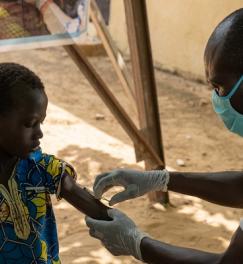
Training
Find out more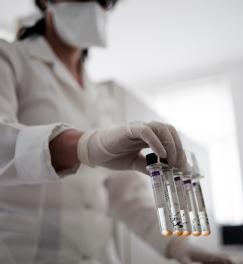
Research Center Niger
Find out more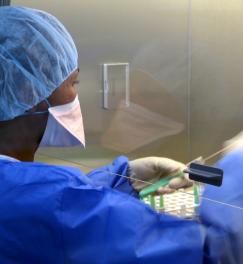
Research Center Ouganda
Find out more